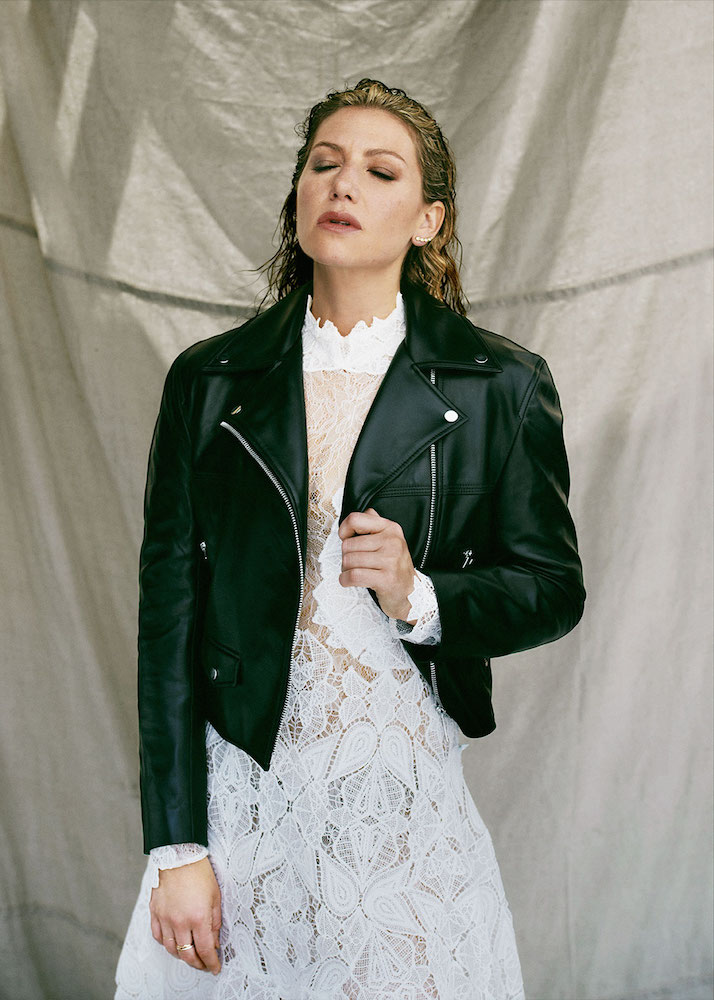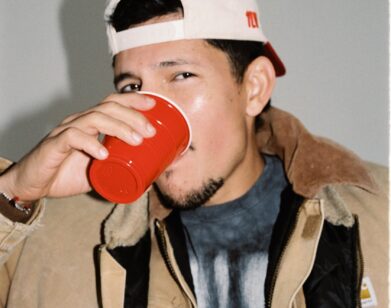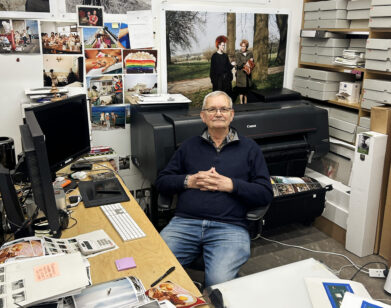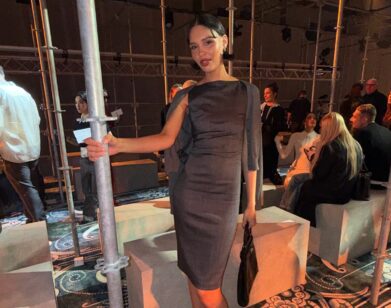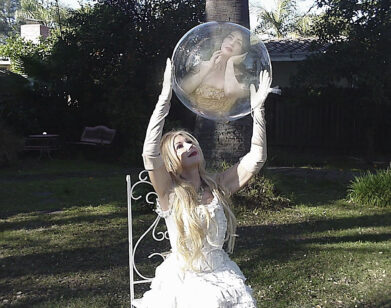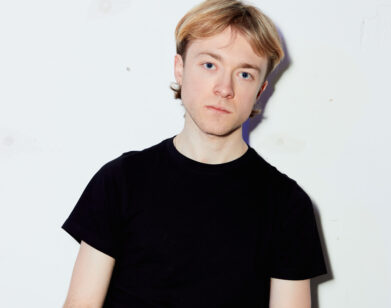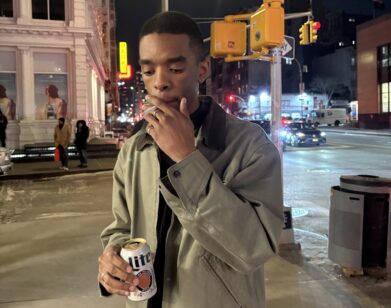Ari Graynor
ARI GRAYNOR IN LOS ANGELES, MAY 2017. PHOTOS: BRIAN HIGBEE/COPIOUS MANAGEMENT. STYLING: TIFFANI CHYNEL/THE WALL GROUP. HAIR: DRITAN FOR FORWARD ARTISTS USING SACHAJUAN. MAKEUP: SAMUEL PAUL FOR FORWARD ARTISTS USING MAKE UP FOR EVER. STYLING ASSISTANT: ROSSANA TORNEL.
For Ari Graynor, I’m Dying Up Here, Showtime’s new, early ’70s-set drama about a group of comedians trying to make it in Los Angeles, was “a gratuitous gift from the universe.”
“I was in a moment of transition in my life and in my career, really asking myself the big questions: why I was doing this, what I wanted to do, what my sense of purpose was,” the actor explains. “I was taking a break from the bigger, more comedic characters I was playing—I didn’t have that in me anymore,” she continues. “It was the project that I didn’t think would ever arrive, and then it showed up in my inbox.”
Born and raised in Boston, Graynor began her acting career in community theater as a young child, and made her film debut in Clint Eastwood’s Mystic River (2003) at the age of 20. Though neither of her parents are professional actors, they were both involved in local stage productions: “My mom was in the chorus of Hello Dolly and The Worldly Players; my dad would build the set,” she recalls. “I was unbelievably lucky in that my parents just listened to me when I was shockingly young and said this is what I want to do.” While she’s played plenty of dramatic roles before—including a recent turn on stage as Maggie, the troubled mother of two teenage boys, in Trip Cullman‘s gut-seizing production of Yen at MCC—Graynor is perhaps most famous for her comedic work in films like For a Good Time, Call… (2012), Whip It (2009), and What’s Your Number (2011).
But Cassie, Graynor’s character on I’m Dying Up Here, is something different—a woman trying to balance her identity in the aftermath of a tragedy with what is expected of a woman in a patriarichal field. “There was so much in the script that I related to so deeply,” Graynor tells us. “I felt, in many ways, like my own personal journey that I had been on that year or two really mirrored what Cassie was going through in the pilot.”
EMMA BROWN: I’m Dying Up Here has such a great cast.
ARI GRAYNOR: It’s incredible. It’s such a special group of people. I think casting a show like this is an art form in and of itself. We’re all so different—the cast is made up partly of real stand-ups, partly of actors, and then partly of just legendary actors, like Melissa Leo. I asked Michael Aguilar, who’s our incredible EP, and Dave Flebotte, who’s our writer and show-runner, are these characters being built on who we are? Or are we just perfectly cast as these people? Because the lines between the two are blurred in this incredible way. They said it’s a little bit of both.
BROWN: We just did a piece with RJ Cyler and that kid is hilarious.
GRAYNOR: He is hilarious. He’s our little baby of the group and he is a character, man. He took to the world of stand-up like a fish in water. He had never done stand-up before and after the table read, Jerron Horton, who’s on the show and who’s also our comedy coach, took him out. Jerron showed up at work the next day and said, “That kid just got up on stage and riffed for, like, 30 minutes without stopping.” Which is definitely not something that I—or any of the other actors-turned-stand-ups—could do, I can tell you that.
BROWN: Did they everyone try stand-up in front of a real audience?
GRAYNOR: They didn’t make us, which was lovely, because I don’t think there’s anything more scary than being forced into doing stand-up comedy. But Michael Angarano and I, a couple of episodes in, did go to a few open-mics and gave it a shot. I signed up under Cassie’s name and did some of the material from the show and fleshed it out a bit. I wanted to see what that was like. The second time, I did some of my own material as well, but it was at one o’clock in the afternoon in someone’s yard with a microphone that wasn’t hooked up to anything, with all of these professional stand-up comedians that we’d seen at the clubs before. Michael and I just looked at each other across this yard, thinking, “What are we doing here?” It didn’t go as badly as it could have, but I also realized my personal mode of expression is not necessarily through stand-up. I think it is the bravest, most difficult, challenging medium. It’s so finely tuned and finely crafted. Every joke is thought about so meticulously, and one word can completely change how the audience responds. You’re up there with no safety net; you can’t shirk responsibility. It’s your thoughts; it’s your voice. You can’t blame it on the writing, you can’t blame it on the editor. You are just up there completely naked.
BROWN: Did you feel that, in real life, people responded to the same moments in Cassie’s material as they did on the show?
GRAYNOR: I specifically chose an episode where I was meant to bomb big time—not because the material was bad, but because Cassie was exploring some pretty big, personal stuff. She was talking about death and things that, especially in the early 1970s, having women come up and talk a certain way was very new. People responded better than I thought. In the show, you could hear a pin drop.
BROWN: There’s a moment where Cassie really opens up on stage and it works for her, which I really enjoyed.
GRAYNOR: I thought it was so powerful when I read it on the page and when we did it. It was so honest and truthful, and it wasn’t manipulative. What I love about our show is that it’s so nuanced and feels very real to me. I think how it explores creativity in general is very real. Cassie getting up and talking about her own experiences, especially after having a much stronger shtick, felt really free to me as an actor and a beautiful moment of expression for her. I also related to that sense of knowing that she has something inside, knowing she has something to share, and wanting to have a certain kind of career but not knowing what that looks like yet. For all creative people, that’s sort of everyone’s journey. You feel something inside and it takes a while to figure out what that looks like and what your voice is.
BROWN: Cassie has it harder than the other comedians, just by virtue of being a woman. Even though the show is set 40 years ago, a lot of the things Cassie goes through are still very relevant and relatable. Did you find that depressing at all?
GRAYNOR: Absolutely. It’s a sad state of affairs in that in the early ’70s, there was a sense of hope and fight about moving forward and, in many ways, the feeling now is that we’ve slid backwards or have remained in the same place. There has been a bit of progress, but I would say overall we are still pretty stuck—if not starting to slide back a bit more—in how we perceive women and women’s roles.
BROWN: I wonder how much has changed specifically in the stand-up comedy scene.
GRAYNOR: It’s still a very male-dominated world. You look at a set list and maybe there’s one woman on there. There are more female stand-ups around, and you turn on Netflix and there are certainly a lot more female specials then maybe you would have seen in the past. We have some really notable comics in our culture right now that are so important to the conversation, like Sarah Silverman and Amy Schumer and Tig Notaro. They stand on the shoulders of all the women that have come before them. At the same time, it’s still very male-dominated. I went to an open-mic in New York just to sit and listen; it was me and eight men in there, and they were telling some pretty rough, sexist jokes and it was dark.
BROWN: That’s the thing—it’s not just that it’s male-dominated, it’s very hetero, sex-joke based. There are so many other things out there that are funny, it’s weird that it’s continued along such a limited line.
GRAYNOR: Agreed. It’s not smart. You look at Richard Pryor and Robert Klein and George Carlin and Richard Lewis—those guys were so smart, they were the thinking-man stand-ups. Those certainly exist today—there are so many genuinely smart, compassionate, sensitive people—but there’s also, just like in the rest of the world, a lot of anger, a lot of sexism, a lot of hate.
BROWN: In terms of timing, did you film the entire season of I’m Dying Up Here and then go do Yen in New York?
GRAYNOR: We shot the pilot about a year and a half ago, which is wild, and then we shot the series from July through November. Then I came right back to New York and immediately started Yen, which was quite a different project, to say the least.
BROWN: I saw Yen and I thought it was brilliant, but I couldn’t imagine doing that every night.
GRAYNOR: It was really intense and also a beautiful experience in a totally different way. Trip Cullman, who directed that play, has been one of my best friends for 12 years and I’ve been wanting to do something that dramatic for a long time, but people thought I was only a comedic actor. It was such a gift to be able to explore and plunge my depths in such a different way, but man, it was tough. There were some nights when I would come home and just couldn’t stop crying.
BROWN: That had such a great cast, too.
GRAYNOR: Yeah that was an incredible cast. The three of them—Lucas Hedges, Justice Smith, and Stefania LaVie Owen—they’re all unicorns. They are unbelievable human beings and some of the finest actors I’ve ever worked with.
BROWN: Do you feel like acting makes you more compassionate in your personal life?
GRAYNOR: Absolutely. I think Yen was a big one for me. She was a character that, on the page, was tough and doing a lot of things that you could easily be judgmental about. I’m not saying I support or believe or condone any of her behavior, but most people, no matter what they do, they don’t think they’re a bad person. The place where their actions are coming from is a complicated place and a whole personal history. I definitely think that it helped me to look at the world a little less judgmentally.
BROWN: As you say, it’s very easy to judge your character in Yen and her approach to parenting, but, at the same time, she has these scenes with her son Bobbie where you can really feel the love between them, and it’s so painful.
GRAYNOR: I think what you come to understand with her is that she has all of this love, but she doesn’t know how to actively love in her life. She didn’t get the love that she needed when she was younger; she didn’t have the family, the situation, the stability—all of those things—to know how to be a good parent. She’s basically following what she knows, and yet she has all of this goodness inside her. I think that’s true of a lot of people. Babies are born whole and then they go through experiences in life that chip away at some of that, and it becomes learned behavior. Especially as I’ve gotten older and my relationship to work and to these characters has gotten deeper—and as I’ve grown as a person and gotten to know myself more—the question of how someone becomes who they become has gotten really interesting to me. It’s probably the guiding question of my life, whether it’s a character or someone that I’m friends with or watching the current political moment that we’re in. It’s important to me to have an understanding of where a character has come from and how their life informs who they are now.
BROWN: You mentioned earlier that, when you got the script for I’m Dying Up Here, you had been rethinking your career and doing a lot of writing. Were you writing towards something specific or just exploring?
GRAYNOR: I had written a screenplay for me to direct called I Am You, and then I was writing some other essays and I wrote another screenplay. I just was trying to find new ways to express myself. With acting, I started as a kid and it was my safe space and the place where I felt the most free to be all of myself. What gets explored in our show is where that instinct starts and where it meets with career, and how that can change your path a bit.
BROWN: I know that you’ve been in a lot of comedies, but you didn’t start out as a comedic actress. Your first film was Mystic River, right?
GRAYNOR: Yeah and in The Sopranos I played Meadow’s crazy college roommate. It’s just really easy—you get on a path. Once you do something that people respond to, they understandably think of you in that way, and you want to work and it’s fun and it’s wonderful. I think a lot of people in all different fields find themselves in a moment of repeating certain beats. There’s also a moment that is personally related to age as well—in whatever field you’re in, you say, “Wait a minute, where am I and how did I get here? How has this changed from my original intent and what do I want to do about that now?” That’s part of the process.
BROWN: Do you remember your original intent when decided to act?
GRAYNOR: I was so young. I started doing community theater when I was seven and I think the intent was just expression. When you’re a musician, you can make music in your room, and when you’re a writer, you can write. Acting is one of the tricky art forms where you need a certain amount of permission to be able to do it. You can talk to yourself in the mirror, but it’s different than actually acting or doing a scene. You need an audience and you need someone else to do it with.
BROWN: Are you still working on the scripts you wrote—specifically the one you want to direct?
GRAYNOR: I’m pausing on that one for a moment, and I’m just finishing up another one and developing a film about this artist named Eva Hesse that I will not be writing, but we’re in the process of looking for a writer. When you’re an actor, people talk a lot about how, at some point, you really have to take control of your career and what you want to do and create your own content. But for me it came from a really natural place of wanting to feel like what you’re putting in the world has some meaning for you.
I’M DYING UP HERE AIRS SUNDAY NIGHTS ON SHOWTIME.

